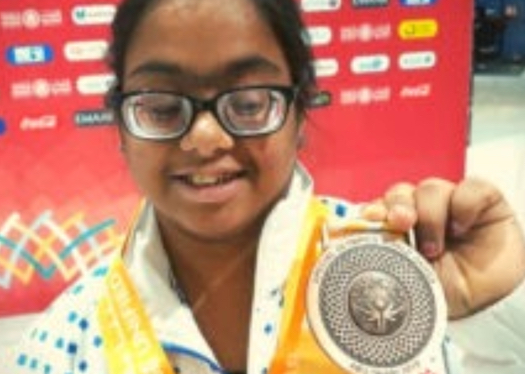When students are in school, teachers observe them in studies and sports and in extra-curricular activities. Some teachers are attentive enough. By closely observing the students, they can judge what the student is capable of doing, performing and achieving. Also when it comes to students with Intellectual Disabilities, there are broadly two approaches that are followed. One is to focus on the disability and not ask the student to try for a normal level of performance. If the student w, aith ID performs at 50% of the normal level, the teacher is happy. But there are teachers who want even the students with ID to try as much as a normal student can go upto. They might then reach up to 70%. By testing their capacity to the fullest, teachers help them develop their talent.
Mr Daivat Liman is the sports teacher at Kamayani School at Gokhalenagar, Pune. He noticed one student, Manali, to be reluctant to take part in outdoor sports. She was stocky and he thought she might be finding it difficult to move and run on the ground. Once he asked students to rearrange the chairs in the class. Manali liked the task and she was picking up chairs easily and putting them in the corner. Something struck Mr Liman at that point. ‘Perhaps Manali can do well in weightlifting.’ He mentioned it to her parents. Her parents organized training for Manali in weight lifting in an outside gymnasium. Manali liked it and took great interest in weight lifting. With encouragement from Mr Liman, her parents allowed her to take part in weight lifting competitions.
Manali competed in Special Olympics Summer Games 2019 in Power Lifting and won a gold medal in Bench Press, after a stirring performance at the finals in Abu Dhabi.
Media had this to say about Manali:
”From a pool of more than 2,800 strong-willed women athletes, this young girl stood out, representing the true spirit of an athlete.”
”19-year-old Manali Manoj Shelke has inspired thousands with her sheer grit and ‘never-give-up’ attitude.”
A power lifter from Maharashtra, Manali attempted and failed to lift the weight three times. That was when her coach approached her and rallied the crowd to motivate her. With the audience rooting for her, the young athlete made another attempt and finally managed to lift the weight.
What followed was sheer joy as she leapt and ran towards her coach and hugged him tightly. The viral video below beautifully captures the memorable moment.
https://www.thebetterindia.com/175888/india-wins-368-medals-at-special-olympics-meet-3-athletes-who-defined-true-grit/

